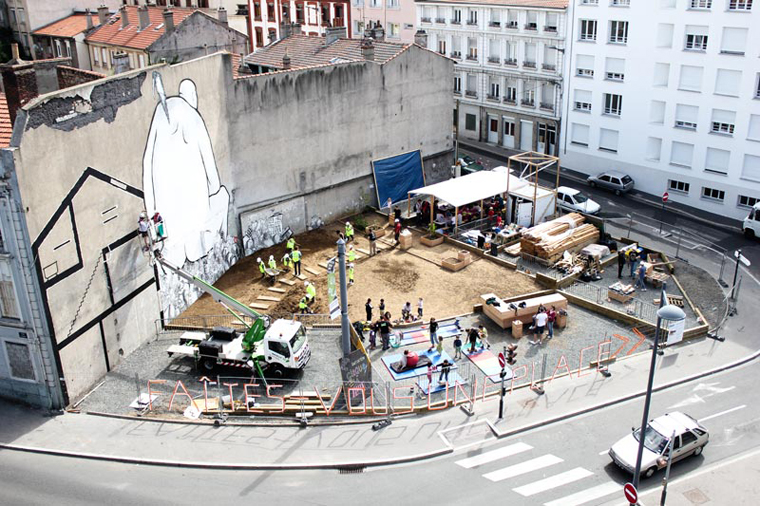
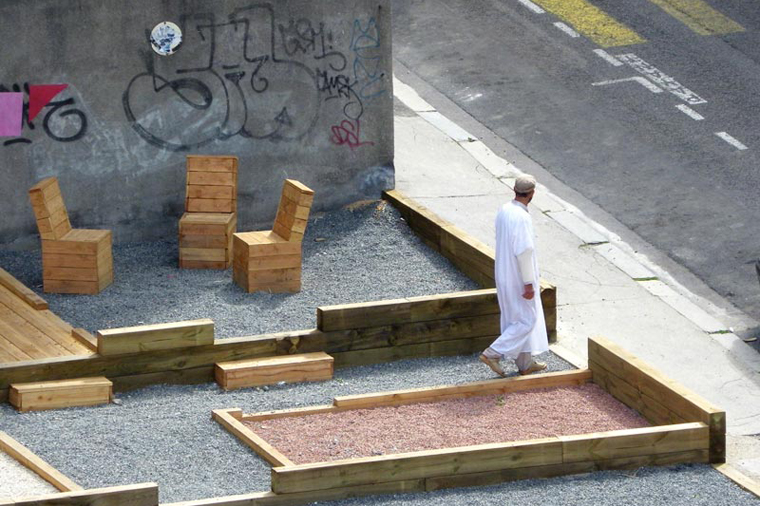
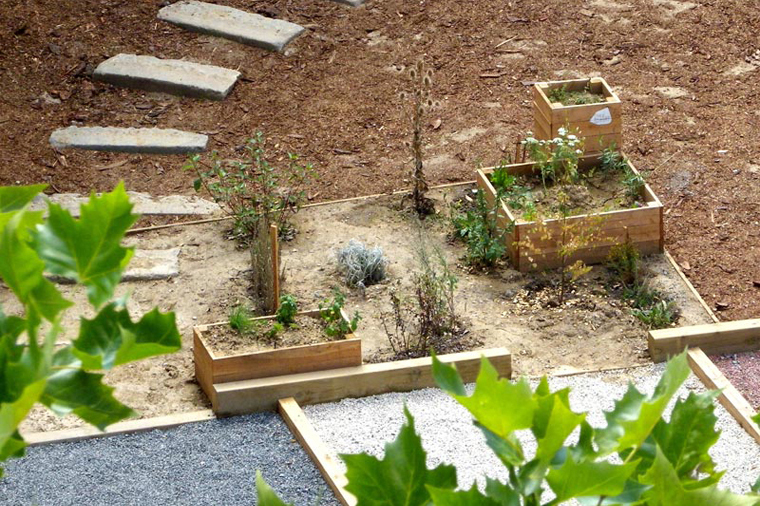
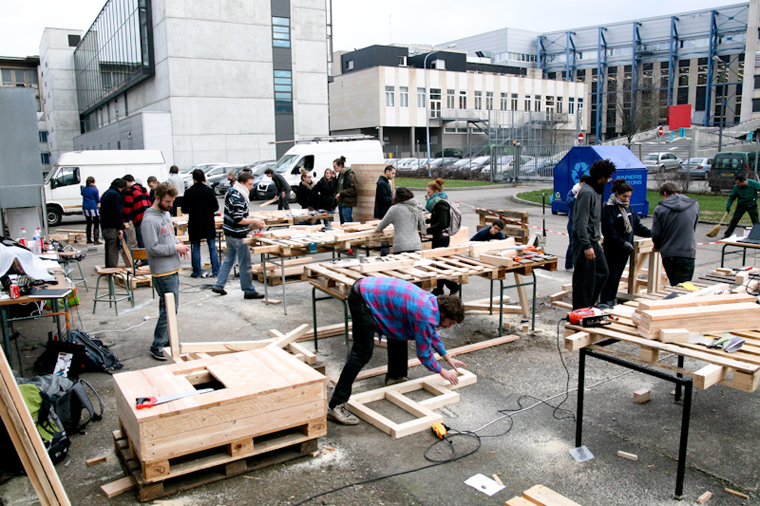

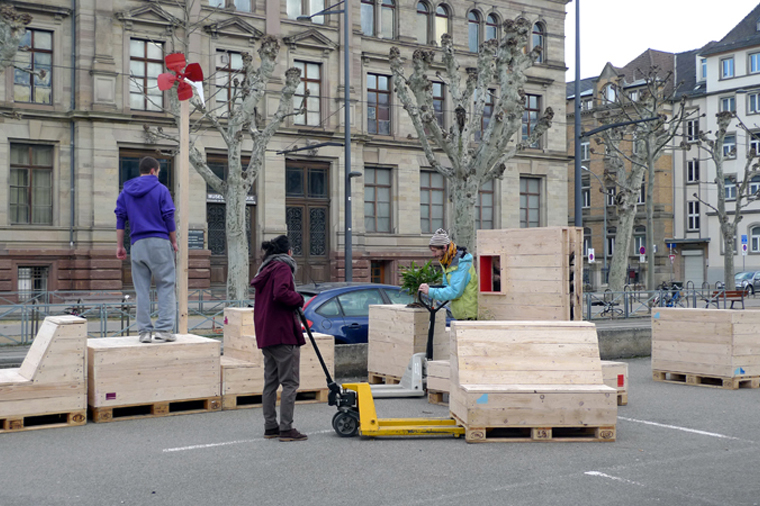
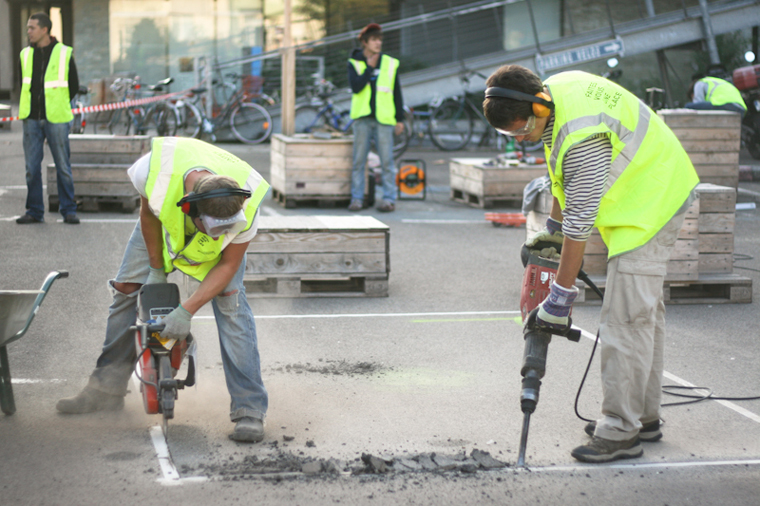
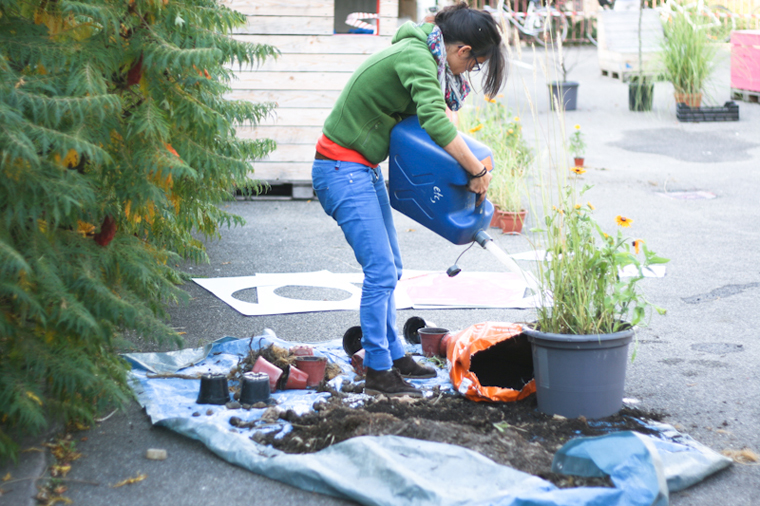
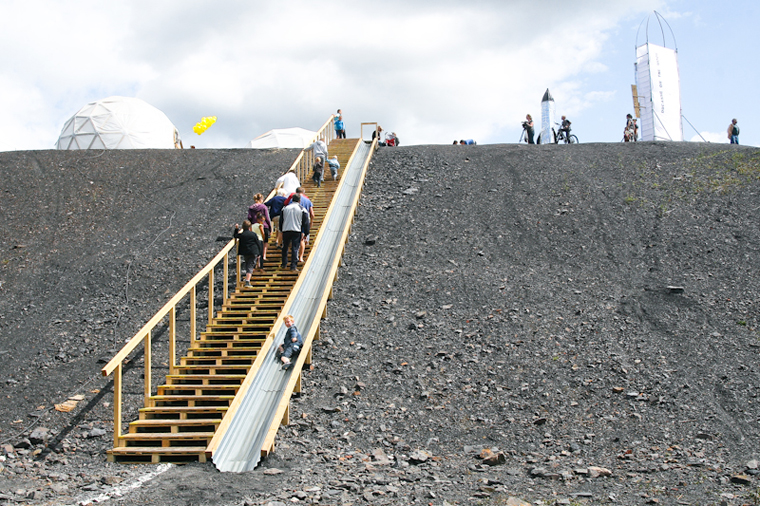

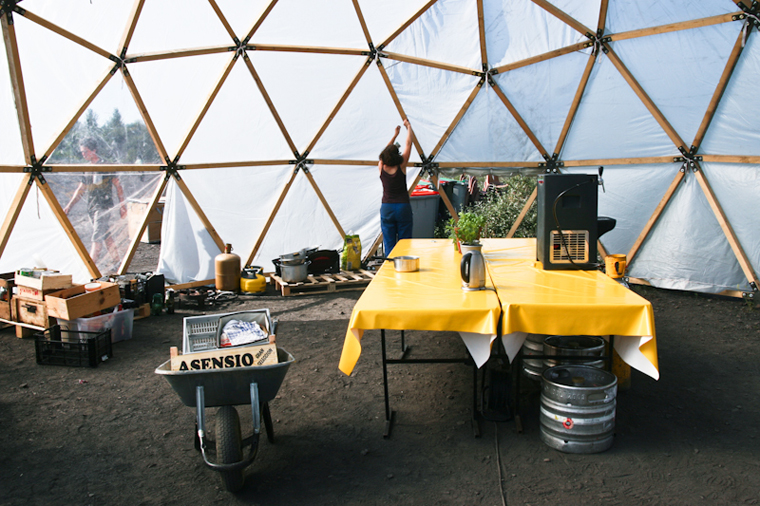



Through a stroke of luck, I was able to sit down with one of the members of Collectif Etc during my visit to Paris. This group (or collective, to be precise) is composed of just over a dozen young French architects who are making their practice up as they go along, and while that in and of itself isn't such a remarkable achievement, the success that they're attaining is. Over the course of a few hours at a sidewalk cafe, I heard about how they started, what they've been up to, the movement they're a part of and the challenges facing them (and others like them) going forward. An instructive conversation, to put it mildly.
nj :: How did Collectif Etc start – it was from school, right?
ce :: Yeah, we’re just a group of friends from two proms… I don’t know how you’d say it: two years? When we started, we were doing street art: we would say, “Ok, let’s meet this Sunday and do something.” without much idea of what it would be.
One day we decided to work on a wall that had these fake windows, and do stuff on them. It doesn’t matter, actually [laughing]. But that day many people came to help us – people from the buildings around, who said, “Oh, maybe you need this tool,” or “Could we help with that?” or “What are you guys doing?” And it became great; it was really nice for everyone, and by the end of the day we said, “Ok, what matters is that people get involved. That’s how it’s interesting for us, and interesting for them.”
We were doing a couple of different things - one day, we decided to work on a small pedestrian bridge, to turn it into a place where people could stay, because it had a really nice view but no one could stop on it. So we designed these origami chairs that people could make out of paperboards.
And then we all left school – as architecture students we got to study many things, and it was really interesting, but we missed one thing, which was to build real-scale stuff that we had designed.

design build workshop // a nous le parking // image courtesy collectif etc
So we offered to organize a workshop for students [at our school] to build furniture for a parking lot that’s right in front of the school. So there was no public space where students can stop a little bit and, like, smoke cigarettes, or eat something, or… there’s nothing. So we said, “Ok, let’s remove all the cars from this parking lot, put them in a parking lot that was behind the school and always empty, which is stupid.” And the school said “Ok, you’ve got a couple of thousand euros, you can buy some materials and organize this, go ahead.”
We did that, it was really interesting - these pieces of furniture that people can move, and the students designed them, and built them, and we were all around and all together, and it was great.
Yeah, I love that project.
Oh, you know it! So the school really loved it also, and decided to extend it: no car is on the parking lot right now. It lasted for one year and a half, and then they asked us to come back and do one thing to show that it’s forever now, so we destroyed a parking space, and planted a tree. It’s a bit symbolic, but we did it.
Ok, so we thought: “That was a good start, and we got some good publicity from it, and it was really interesting.” And we applied to a competition to design a public space in Saint Etienne. When the jury was happening, we said, “If you pick us, you have to know that you have to let us manage all the money, and you have realize that we will do a collaborative, participative work with all the inhabitants. That’s what we stand for – if you don’t accept that, we don’t want to win the competition.” And they picked us, so they said, “Ok, we trust you.”

site view // place au changement // image courtesy collectif etc
When some of us went to St. Etienne to prepare, we already had in mind this idea of taking one year off to go around France, meet all the people who work in the field we work in, to see how things could be, to create a network between these people, and to see if we could have some room in it, if we could actually exist and survive.
And the project in St. Etienne was really – it was great. It was amazing, actually. So we decided, after this stuff, we go around. In September and October last year, we started preparing the ground. We had two goals: one was meeting all these people and creating a network, and one was work with those people, create projects, and build stuff.
And you guys made a lot of projects as you went.
So, we did around 15 projects, or something like that.
Wow.
Yeah, it was great: we met and worked with so many from different fields, with different interests. We worked with municipalities and with associations, with schools, with social centers, with random people. We worked in the center of cities, and we worked in neighborhoods outside of cities, in rich places, poor places. We worked in villages… So it’s been really amazing, and the response from everyone was great. Because politically, it’s always great – no municipality can say no to somebody who comes and says, “Ok, I’m trying to legitimate any action on the public space: do you accept that or not?” They can’t say no, or they will lose votes for the next election.
Did you collaborate with someone every single time you made something?
Yeah, we tried to. We tried. In some places, there is no such structure. Like I come from Rennes, and we did a project in Rennes, and there’s really nothing.
You must have a really good understanding of this movement in France – I think right now it is more in France, than perhaps any other place, that there is this type of thought or engagement. Do you have some – maybe it’s impossible to say, but do you have some insight to why this is happening now?
I would say that by the late 90’s, Brut d’Frigo and Colloco, and some structures like Atelier d’ Architecture Autogeneré – there were a couple of groups who appeared out of the blue, and they fought for things, and they are still alive now. I mean, many of them [have since] stopped, but they were the first group of people who said: it is possible. This is what we believe in and it is possible.

interior view // on the moon // image courtesy collectif etc
It was not fashion then, it was not really what it is now: it is trendy to be, to work, in this field, I would say. But ok, so there was this moment then, nobody heard much about it, but now the actual trend is social - it’s easy to communicate with people; it’s easy to get collaborative tools. So these tools, and the fact that the background was already there, I think explains the fact that we just appeared and that so many groups such as us are…
Kind of appearing all at once.
Right now, yes. We’ve been meeting all these people - we’ve interviewed like 30 groups, and we are creating a platform called superville.org where the experiments we’ve been doing, and news people have, will appear. The aim is to show, to explain processes: to make them legible to the people who can make decisions. We want this not to be our product, but the product of the whole community of people, a tool that everyone can be involved in and everyone can use.
I think that’s a really fantastic idea. It becomes like a handbook for this way of working, so that other people can also attempt it.
Yeah, we think we have to give back what they gave us, when we met all of them and they were so amazing. It’s been really great, because [it makes] you feel like things are possible.
And for you – I mean, for the collective - it seems like you’re thinking about what happens next or how it evolves. How this goes from being a bunch of students who can volunteer their time to make something in a parking lotx to something else.
Well, we think it’s not enough to talk to people – we think it’s better to do things together. That’s why we, the projects we do… In Bordeaux, we worked on a public square; we did these workshops everyday where people could come and saw wood and we had nails, screws, whatever.

structure // bons plans pour le refuge? // image courtesy collectif etc
But then, this is not for everyone. This is for people who are interested in [building things]. So we believe there should be food lessons, there should be music, a concert, there should be round tables – that’s really important, actually – and there should be petanque competitions or whatever, to make sure that everyone can come and talk about what matters. And what matters is living together in a place.
The idea of psychogeography – that a thing can make an impression that can change a place for someone – is this also part of your way of working, thinking about the sort of psychological impression you’re making in public space?
It is, by [a matter of] fact, but [we didn’t think about it] this way at first. We’ve realized this is a real lack, so we are working with the University of Marseille, with a group of researchers, sociologists, to evaluate the way our work has had an impact on people, businesses, and municipalities. So they’re going to do some systematic research – they call everyone six months after, two years after, to see how things will evolve.
It’s really fascinating as a way of working. Do you have an ambition to move beyond temporary use? So far you always work in public space with these temporary interventions – is that just because that’s how you started, and it’s a very easy way to bring people together? Because you’re a bunch of architects, right? So maybe it’s not quite so usual that you always want to work in the public space…
It’s because it makes us feel great! No, really! You learn from people, you see what you’re doing. By the end of every day you know what has been done, what has not been done. You feel like what you’re doing can be changed and corrected. Like, we don’t care if a town decides to destroy, to remove or change everything we did.
In French, to say “a piece of furniture” we say “mobilier”, which means mobile. But it’s not mobile! There is no piece of furniture that is mobile in the public space! We believe that the city should evolve as people evolve, and that means all the time. Temporary interventions are a way to show that with little money, much ambition and many people, you can do great things.